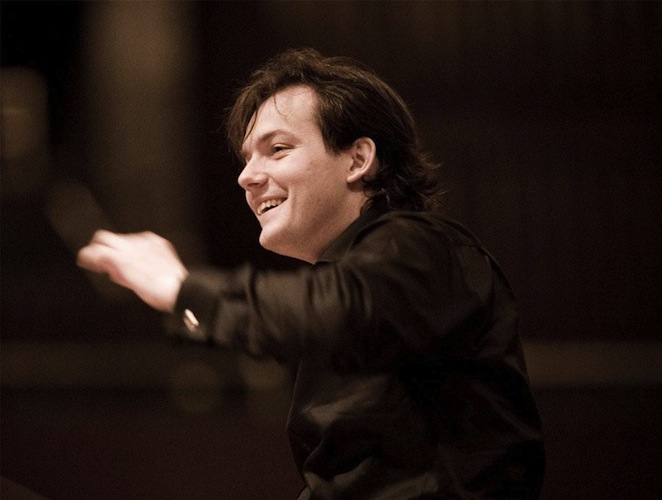Classical Music Commentary: Boston Symphony Orchestra Season 2014-15 — A Jolt of Energy and Stability
Most of the programs during BSO conductor Andris Nelsons’ ten subscription weeks look fresh and, if not outright adventurous, on paper they at least look more exciting than not.

The BSO’s Andris Nelsons — For those hoping that his first season would mark a wholesale invigoration of the BSO’s approach to the standard repertoire, the answer is no. Photo: Konzertagentur Schmidt.
By Jonathan Blumhofer
Andris Nelsons announced his inaugural season as the Boston Symphony Orchestra’s (BSO) music director on Wednesday at Symphony Hall, bringing a jolt of energy and stability to what has become an unpredictable annual tradition. On the whole, there is plenty to look forward to, including several premieres, some surprising repertoire, and a two-week long European tour in the summer of 2015.
Most of the programs during Nelsons’ ten subscription weeks look fresh and, if not outright adventurous, on paper they at least look more exciting than not. Given the fact that he only made his BSO debut in 2011, it’s appropriate that his first season at the orchestra’s helm have something of a get-to-know-you feel. Opening night (September 27) features music by Wagner, Mascagni, Puccini, and Respighi. Jonas Kaufman and Nelsons’ wife, Kristine Opolais, are the featured soloists.
The rest of his of concerts focus on two recurring strands of his musical DNA: music written by composers from Eastern Europe and works from the German symphonic tradition. Among the highlights are Bartók’s Miraculous Mandarin Suite and Tchaikovsky’s Pathetique Symphony (October 1-3); Sofia Gubaidulina’s Offertorium (with violinist Baiba Skride) and Sibelius’s Symphony no. 2 (November 6-11); Tchaikovsky’s infrequently-heard Hamlet and Stravinsky’s Rite of Spring, plus the American premiere of Brett Dean’s Dramatis personae (with trumpeter Hakan Hardenberger, November 13-18); Prokofiev’s Symphony-Concerto for cello and orchestra (with Yo-Yo Ma), a new piece by Eriks Esenvalds, plus music by John Harbison and Rachmaninoff (November 20-22); a new work for organ and orchestra by Michael Gandolfi and Mahler’s Sixth Symphony (March 26-31); Shostakovich’s Symphony no. 10 (April 2-4); and Gunther Schuller’s Dreamscape, alongside pieces by Mozart and Richard Strauss (April 9-14).
For those hoping that Nelsons’ first season would mark a wholesale invigoration of the BSO’s approach to the standard repertoire, the answer is no. There remains a frustrating overemphasis on canonical works heard (sometimes repeatedly) over the last four or five years. Brahms, for instance, is particularly well represented: the Variations on a Theme of Haydn, Violin Concerto (both heard here in 2013), and German Requiem (last performed with Dohnányi in 2012), suggest that a) either you can never have too much Brahms or b) there isn’t that much repertoire out there to choose from. At least we haven’t heard his Piano Concerto no. 1 or First Symphony at Symphony Hall for a few seasons (they return in October and May, respectively).
Next season the BSO exchanges its recent over-emphasis of Beethoven (only two of his symphonies, the Fifth and Eighth, and the Violin Concerto, appear) for heavy doses of Mozart: no fewer than five of the piano concertos and an equal number of symphonies (only the “Prague” is missing from the list) turn up, mostly in the last two months of the season.
Otherwise, the orchestra’s most exciting programs (after Nelsons’) belong to mid-season guests. Vladimir Jurowski returns to Symphony Hall in February with a world premiere by Harrison Birtwistle (featuring pianist Pierre-Laurent Aimard), as well as music by Anatol Liadov and Stravinsky’s Firebird (February 12-14). The following week (February 19-21), Stéphane Denève leads a program of ca. 1920s-40s music by Stravinsky, Prokofiev, Milhaud, and Poulenc. After Denève, comes Charles Dutoit, whose recent residencies have become can’t-miss events. It looks the same for next year: music by Stravinsky and Debussy preface the aforementioned Brahms Violin Concerto in his first week (February 26-March 3), and the first BSO performances of Karol Szymanowski’s opera King Roger are the sole focus of his second (March 5 and 7).
Other returning friends include Christoph von Dohnányi (leading music by Richard Strauss and Mozart in March) and Bernard Haitink, whose programs close the BSO’s season with music by Ravel, Adés, and Mozart (April 23-28) and Schumann, Mozart, and Brahms (April 30-May 2).
Conspicuously absent from the podium this year is Thomas Adés, whose appearances over the last three years have resulted in, hands down, the orchestra’s best programs and some of its best playing; hopefully, he’ll be back soon. Tugan Sokhiev and Asher Fisch make their BSO and subscription series debuts, respectively, both in January. Juanjo Mena, Christian Zacharias, Marcelo Lehninger, and Rafael Frühbeck de Burgos also conduct programs throughout the season.
Among soloists slated to appear, it’s a very good year for violinists: Christian Tetzlaff, Frank Peter Zimmerman, Julia Fischer, Leonidas Kavakos, and James Ehnes appear (in addition to Ms. Skride). Several pianists, including Rudolf Buchbinder, Emmanuel Ax, Richard Goode, and Maria João Pires are on the roster, and Olivier Latry returns as soloist on the Symphony Hall organ.
So, heading into the fall it looks like the Nelsons era will begin with lots of promise and not a little ambition. No one’s going to be mistaking the BSO for the New York or Los Angeles Philharmonics – not yet, at least – but for the first time in several years, there’s a coherent season to look forward to, and some things to be genuinely excited about on the corner of Massachusetts Ave. and Huntington.
Jonathan Blumhofer is a composer and violist who has been active in the greater Boston area since 2004. His music has received numerous awards and been performed by various ensembles, including the American Composers Orchestra, Kiev Philharmonic, Camerata Chicago, Xanthos Ensemble, and Juventas New Music Group. Since receiving his doctorate from Boston University in 2010, Jon has taught at Clark University, Worcester Polytechnic Institute, and online for the University of Phoenix, in addition to writing music criticism for the Worcester Telegram & Gazette.
